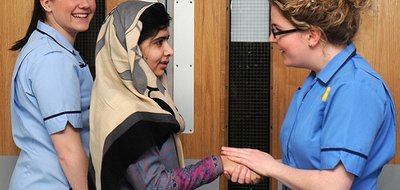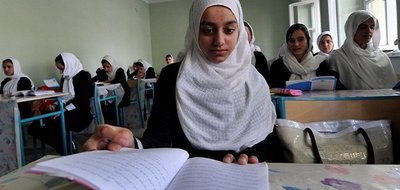“Today you can see that I’m alive,” said Malala Yousafzai in her first interview since surviving a Taliban attack that left her with a bullet lodged in her skull last October.
 Malala Yousafzai says goodbye to nurses as she leaves the Queen Elizabeth Hospital in Birmingham, United Kingdom.
“This is a second life,” she continued, “And I want to serve. I want to serve the people. I want every girl, every child, to be educated."
Malala Yousafzai says goodbye to nurses as she leaves the Queen Elizabeth Hospital in Birmingham, United Kingdom.
“This is a second life,” she continued, “And I want to serve. I want to serve the people. I want every girl, every child, to be educated."

Periodic attacks occur against girls, teachers and their school buildings, usually in the more conservative south and east of Afghanistan, from where the Taliban draws most support.
An Afghan high school student reads a text book during a class at the Lycee Malalai school in Kabul. The Afghanistan Ministry of Education's plan for 2010 to 2015 is to increase enrollment in basic education, especially among girls.
Malala was coming home from school on October 9, 2012, when an armed Taliban gunman stopped her bus and shot her in the head and neck, and wounded two other schoolgirls.
A Taliban spokesperson said they tried to kill Malala because they view her as a “symbol of Western culture,” and “against Islam.”

Attacked for speaking out about girls’ rights
Malala grew up in Pakistan’s Swat Valley, a picturesque region that is also home to a branch of the Taliban, a militant group that is trying to enforce their own vision of religious law. The Taliban does not believe that girls should go to school or even leave their homes without covering themselves from head to foot and walking with a male relative. Malala began speaking out against such restrictions when she was 11 years old and the BBC, a British news organization, asked her to blog about her life. She wrote about her struggle to simply go to school, and even though the blog was published under a pseudonym to protect her identity, she gradually became a public figure. She challenged the Taliban in speeches, asking “how dare the Taliban take away my basic right to education?” She also criticized the Pakistani president, saying that if his daughter lived in Malala’s town he would have made sure the girls’ schools remained open.

